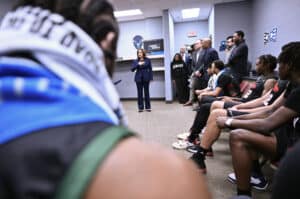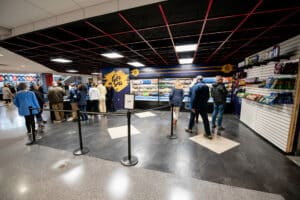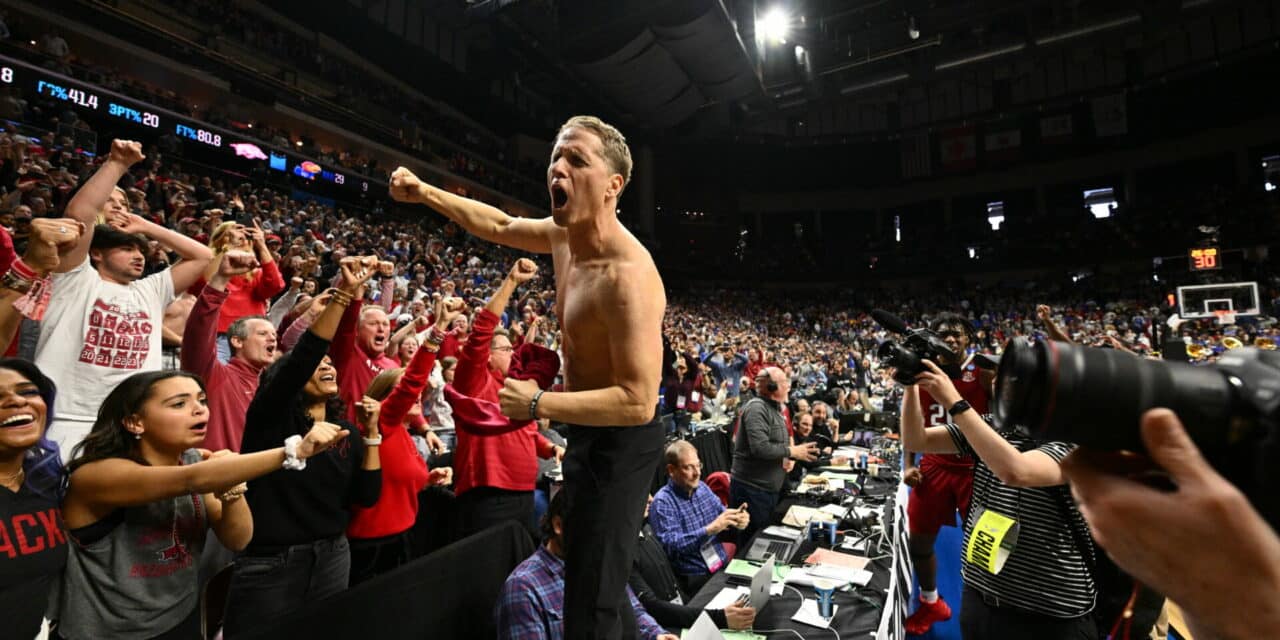HIGH ON THE HOG: Arkansas coach Eric Musselman bares his chest in celebrating the Razorbacks’ upset win over Kansas in the second round of the NCAA tournament at Wells Fargo Arena. (Getty Images)
Wells Fargo Arena welcomes present, past vice presidents
A pair of arenas in secondary markets were among the venues that got high marks across social media from fans attending the first two rounds of the 2023 NCAA men’s basketball tournament.
Wells Fargo Arena and Greensboro Coliseum are no strangers to sharing college basketball’s biggest stage, but in both markets, arena officials made some tweaks to improve the experience for patrons and operational staff.
In Des Moines, Iowa, where Wells Fargo Arena played host to NCAA postseason play in 2016 and 2019, the biggest adjustment this year took place on Thursday, March 16, the first full day of tournament play with four games split into two sessions. It’s typically a long day for everyone involved, running an event for 12-plus hours with thousands of fans in the facility over the course of the day, separated by a two-hour break at the halfway point in which venues are cleared between the two sessions.
To help make things a little bit easier on everybody involved, OVG360, which runs the Iowa Events Center, a public assembly complex that includes the arena and convention center spaces, pre-scanned tickets to streamline the process for fans entering the building for Thursday’s second session, said Chris Connelly, the complex’s general manager.
To make it happen, officials set up tables at multiple locations inside Wells Fargo Arena and at the fanfest set up at Hy-Vee Hall across the street. At those tables, mobile tickets for session two were scanned and wristbands distributed to allow patrons back into the arena as quickly as possible prior to the start of the final two games of the day.
“It’s intense; that Thursday is tough with four basketball games and a tight turnaround,” Connelly said.
All told, about 6,000 tickets for Thursday’s second session were pre-scanned, which helped OVG360 operationally in a building that seats close to 17,000 for college hoops, including portable seating. Connelly estimated about 11,000 people were in their seats by the start of the Colgate-Texas game, the first contest of the second session.
Getting ahead of the crush provided another benefit for OVG360, considering three political dignitaries attended games at Wells Fargo Arena. U.S. Vice President Kamala Harris, a Howard University graduate, sat in a suite to see her alma mater play Kansas on Thursday. On Saturday, former U.S. Vice President Mike Pence sat in regular seats for the Arkansas-Kansas game. In addition, Iowa Gov. Kim Reynolds attended games on Thursday and Saturday.

PEP TALK: U.S. Vice President Kamala Harris, a Howard University graduate, speaks to the school’s basketball team at the NCAA tournament. (Getty Images)
Officials didn’t know about Harris’ appearance until three days before the tournament, Connelly said. Despite the relatively short notice, OVG360 was prepared for the additional layer of security. The U.S. Secret Service flanked Harris in the suite, with other officers stationed in the hallway. The suite level was shut down for foot traffic when Harris arrived and exited the arena.
OVG Hospitality runs the food service at Wells Fargo Arena. Connelly declined to provide sales figures but said the vendor sold more than 5,000 premixed cocktails served in cans. The NCAA has allowed the sale of alcoholic beverages in general concessions since the 2019 tournament, but still prohibits the pouring of hard liquor in public spaces, with the exception of those packaged drinks, Connelly said.
Parking is limited at the Iowa Events Center, and to help alleviate that issue, officials worked with Principal Park, home of the triple-A Iowa Cubs, situated less than a mile from the arena, to provide remote parking, which they have done for all three tournaments in Des Moines. Attendees paid $15 to park in the stadium lots and take a shuttle service to Wells Fargo Arena, with one stop in between on Court Avenue, Des Moines’ downtown entertainment district. Connelly said hundreds of people selected that parking option to avoid vehicular traffic congestion around the arena.
The NCAA second round in Iowa concluded on March 19. With the eight-team cut in half to four on that day, there was no need pre-scan tickets. Overall, Des Moines proved itself again in the national spotlight, Connelly said.
“Each time, we pick up a few more tricks and different strategies,” he said. “We get better every time we host it, and from what we could see, the NCAA was happy. With the exception of single session tickets released last minute, we were sold out heading into all three sessions. I was told that we were the first site to sell out after the public onsale.”
In Greensboro, the NCAA tournament returned to the coliseum for the first time since 2012. The event was booked for the arena in 2020, but it was canceled at the start of the pandemic. Previously, the NCAA pulled 2017 first and second round games from Greensboro over a controversial transgender bathroom bill in North Carolina. For this year, total attendance for the March 17 and 19 event was just short of 50,000, with crowds averaging about 16,600 per session in a building with 21,000 seats, coliseum spokesman Andrew Brown told local media outlets.

GO FOR IT: The new grab-and-go market at Greensboro Coliseum helped boost per caps for the NCAA basketball tournament and both ACC tournaments. (Courtesy venue)
The coliseum has undergone several upgrades over the past year, including construction of four new sideline suites, a rebranded club and a new grab-and-go market, which helped boost per caps to $19.50 on Friday and $22 on Saturday, said Scott Johnson, the coliseum’s deputy director. Those numbers are about 100% higher than in 2012, when alcoholic beverages could not be sold in general concessions, Johnson said. The NCAA changed that rule starting with the 2019 tournament.
OVG Hospitality also runs the food in Greensboro and branded the market as “On the Go.” It was tested for the ACC women’s basketball tournament before fully operating for the ACC men’s tournament one week later, in which the event produced a $20 per cap.
The grab and go, converted from an old pizza stand in the southwest corner of the main concourse, is a self-checkout operation that accepts only credit and debit cards. Coliseum officials made the transition after speaking with OVG Hospitality President Ken Gaber, an advocate of the concept. The coliseum has not gone completely cashless because it sits in a heavy blue collar region of North Carolina where many people still prefer to pay with cash for concessions, Johnson said.
“We agreed to help convert one of our stands and it came out better than anybody expected — very nice, modern, clean and neat,” said Matt Brown, managing director of the Greensboro Coliseum Complex. “The footprint there worked best because you can get a lot of people in that space. Our next mission is to build one at the aquatic center next door, where patrons all use credit cards.”
At the big league level, Amway Center was one of three NBA arenas playing host to NCAA first and second round games.
The Orlando, Florida, facility fell in line with higher per caps trending, due in part to alcohol sales. Levy, the arena’s concessionaire, reported per caps in the range of $38 for the NCAA tournament, which was close to doubling the average spend of $21 for the 2017 event, the last time it was held at Amway Center.
In Orlando, total attendance was 49,924 for NCAA tournament play. Doing the math, Levy generated $1.9 million in food and drink receipts.
The addition of sales tax on top of the retail price is also driving higher food and drink sales, arena managers said. In Florida, sales tax is 6.5%, said Allen Johnson, the city of Orlando’s chief venues officer. Going cashless was a factor as well, increasing speed of service and producing a greater number of transactions, Johnson said.







